Struggling to come up with things to write about? Just need non-boring blog post ideas?
You’re in great company!
99% of bloggers and writers go through this at some point.
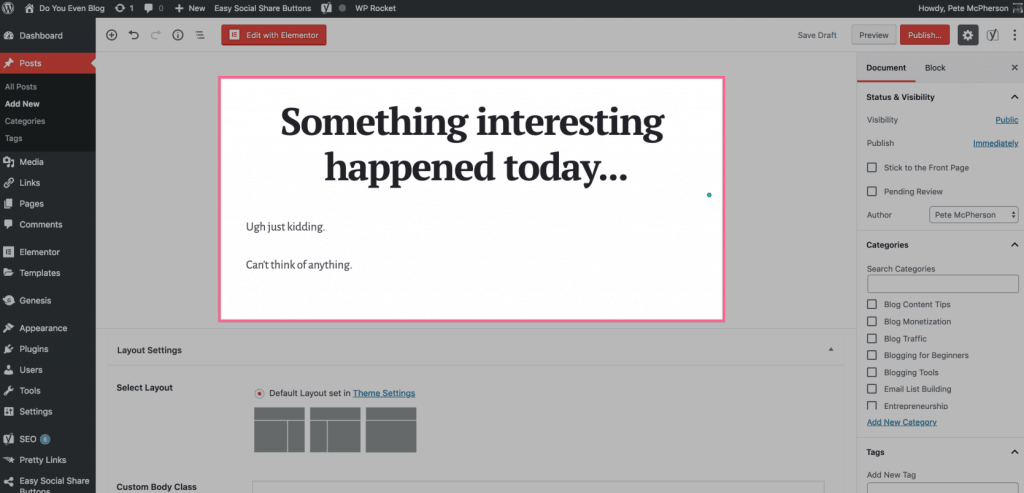
So let’s conquer that blank page, cool?
Here’s a list of ideas you can use to generate a bulk of blog post ideas ?
Super important note for bloggers:
If you read through this list and find yourself thinking…
- “This topic has been covered before!”
- “What gives ME the right to write about this topic?”
- “Nobody cares what I have to say…”
Ignore that voice!
Yes, the internet is a busy place, and all of your topics have been covered before—but not with your unique perspective.
More people are coming online to the internet every day. You will reach new people.
Make better content and give us what you got.
1 – What makes you angry (about your topic)?
Be honest. What fires you up and gets your blood boiling?
Is there injustice? If you were king of the world, what would you change and why?
FYI, there’s no need to actually write a super-angry-negative post. You can simply use your passion at a starting point for writing something, well, passionate. People ENGAGE with passionate content.
Example: I can’t stand it when I sign up for somebody’s email newsletter, only to get bombarded with emails every day! I turned this into a manifesto, The Sad Truth About Online Business.
2 – Write a common “how-to” post—except geared towards a 5 year-old.
How-to posts are more plentiful than grains of sand—but what if you simply added a new twist?
Write a teaching post, but literally gear it to a young child.
In fact, make it clear in your article headline (and intro) what you’re doing! That’ll make it fun and interesting.
Example: How to Start a Blog – A Simple Guide on a 2nd Grade Reading Level
3 – Use Google to write a “disagreement post.”
The idea here is to seek out opinion pieces on your general topic—let’s say “personal finance,” and write about why you agree or disagree with it.
- Head to Google
- Type in “inure:opinion [your keywords]”
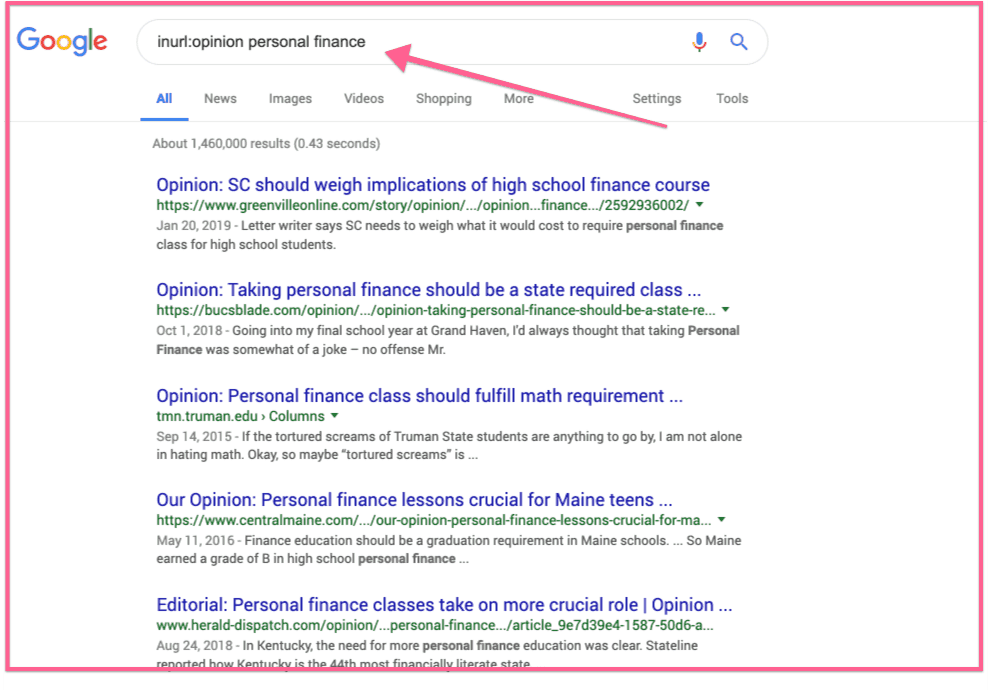
Browse through some posts based on the titles you’ve found, and see if there’s a agree/disagree post you can craft.
Example: “The New York Times says Math is Crucial to Personal Finance. Here’s Why That’s Not True.”
4 – Write a letter to your grandchildren.
What would you want your kids or grandkids to know about your topic?
What would you teach them? How should they behave 20 years from now? Write a future letter to them! (Be sure to include a bit of your own story to help teach them).
Your readers will enjoy this unique format.
5 – Make a prediction about the future.
What will the future hold for parenting? For travel hacking? For pizza?
The great thing about predicting the future is that you’ll almost certainly be wrong, but that doesn’t matter! Your readers will appreciate new ideas related to your topic.
Example: What Does the Future of Blog Traffic Look Like? Here’s 3 Things I Know.”
DYEB Pro Tip: Writing about the future gives you authority.
Think about the word “thought leader” and what that means.
As a content creator, we are always fighting to gain authority and respect with our audience—how else will they listen to us, follow us, and buy our products?
When we present new ideas, opinions, ideals, or visions for the future—we set ourselves apart from competitors who are merely “producing content.”
Be a thought leader.
6 – Write about a failure.
Off the top of my head, I can think of 50+ things to write about involving struggles, failures, or stupid stuff I’ve done.
Important Note: Sharing your own struggles and being vulnerable does NOT detract from your authority on your topic! In fact, writing about your failures (and the lessons you learned!) builds rapport with your readers and makes a personal connection.
Example: “I Once Went Into Massive Credit Card Debt. Here’s What Happened.”
7 – Write about a win.
Without being “look how insanely AWESOME I am” boastful, think of a time where you really came through and kicked butt.
What were the exact steps you took? What helped you along the way? How can others replicate your success?
8 – Analyze your existing high traffic posts
If you’re a blogger, you can
- Head to Google Analytics
- Dive into Site Content
- Look at your topic performing posts
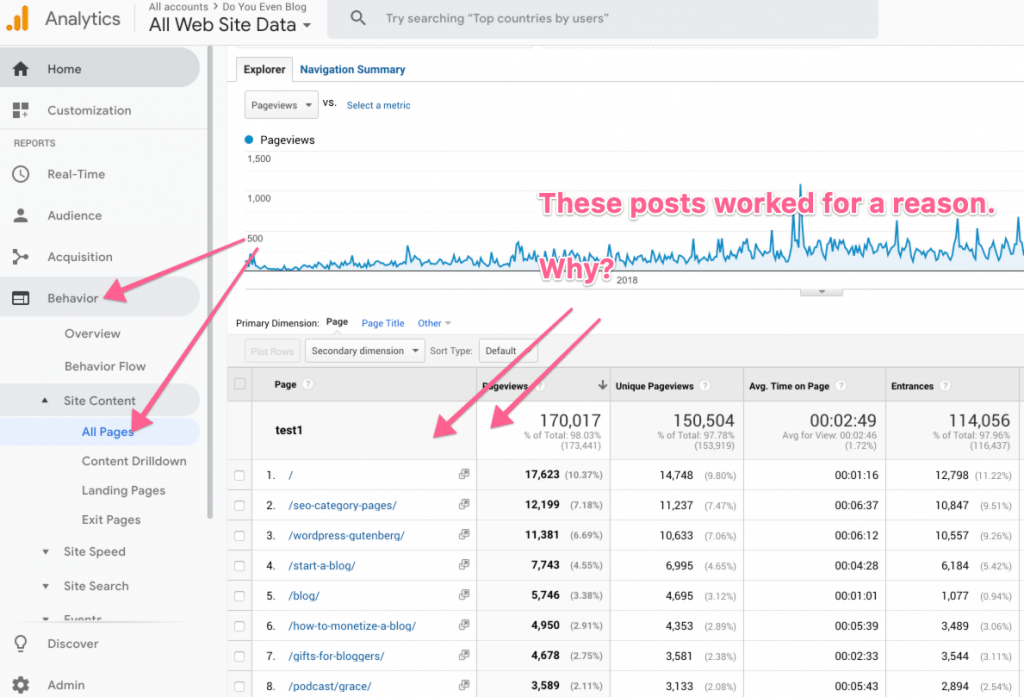
What made these work? Which topics have performed better?
From here, you can do 2 things:
- Brainstorm more posts based on top-performing topics
- Create blog post ideas based on sub-topics of those top posts.
Example: Based on my SEO Category post in the image above, I might write “Here’s What to Write on Your Archive Pages to Boost SEO.”
9 – Analyze other people’s top posts ?
Not a blogger (or new blogger)?
Here’s what you do:
- Identify a few other websites in your niche (or that cover your topic)
- Go to Google
- Type in “site:example.com” and hit enter
- Optional: Feel free to add keywords as well. “Site:example.com [your topic]
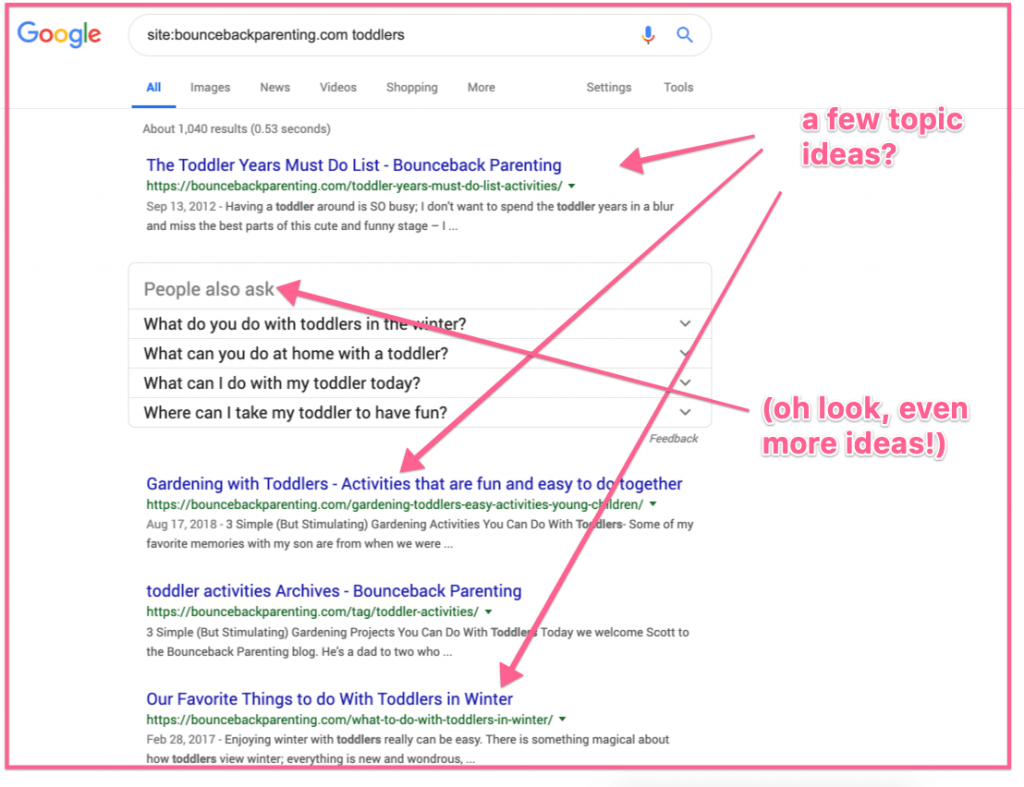
Use the search results as inspiration for stuff to write about.
10 – Ask your readers what they want to read about
If you have email subscribers, followers, etc, ask them for topic ideas!
What do you really want to get better at right now? (with your #blog)
— Pete McPherson – DYEB (@doyouevenblog) October 8, 2018
Here’s some questions you can ask:
- “What’s your favorite article I’ve written?”
- “What are wanting to learn more about right now?”
- “I’m looking for some new things to write about—gimme some blog post ideas!”
?
11 – Use a blog post idea generator
These sites will let you enter a few “seed keywords,” and then spit back some headline ideas.
Note: You probably won’t fall in love with the suggestions they give you DIRECTLY—but hopefully it’ll spark a few easy topic ideas!
Try out HubSpot’s Idea Generator or Portent’s Title Maker. They’re my favorites.
12 – Use Answer the Public.
This free tool will take any general topic (or specific ideas) and spit back a bunch of related questions!
Even typing in broad keywords like “budgeting” can yield loads of writing ideas.
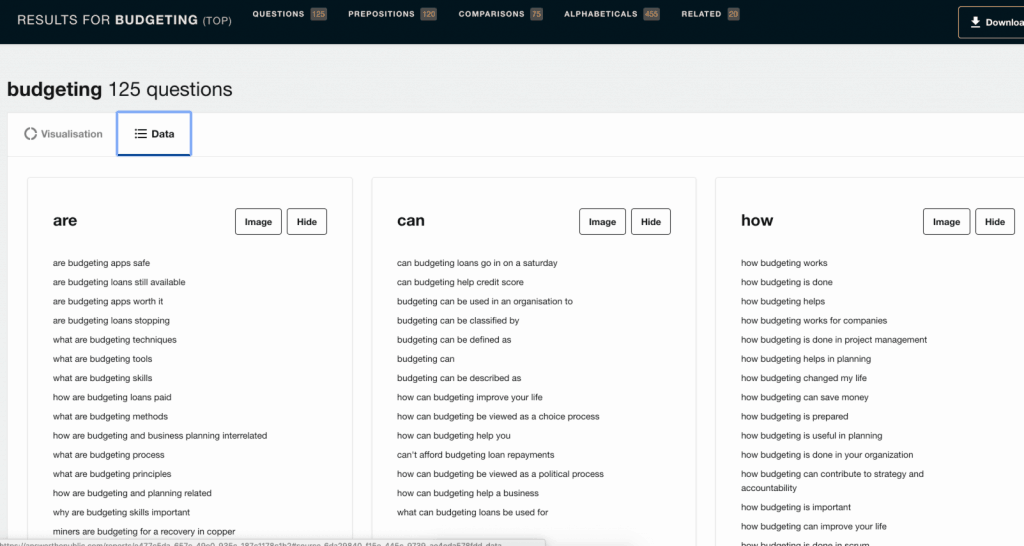
Pro Tip: If you’re writing a mega-post (a long-form article for SEO), you might consider literally including these questions (and your answers) within your post! Sorta of like a F.A.Q. section.
Readers love a simple questions & answer format.
13 – Focus on a small detail from a previous post.
You could either choose a long-ish post you’ve already written, one of your top-performing posts (as discussed above), or somebody else’s long-form post.
Choose one bullet point or sub-topic from that post, and turn it into a more detailed blog post!
Example: I could take my 10,000 word post on blog monetization, and create specific posts on “How to Set Up Google Adsense” or “How to Launch Your First Product.”
Example: I could take THOSE posts, and do this further. From the “first product” post, I could write “3 Copywriting Techniques You Need to Know for Your First Product Launch.”
14 – Write about how you started (within your topic)
What happened to get you interested in your topic? A specific event? A general desire to learn?
Share your origin story.
Why you should write more stories.
Human beings can’t help it—we love stories!
Whether it’s personal experiences or tall tales you make up—a story engages readers. We always need to know what happens next.
You can use relevant stories as stand-alone articles, or use them as blog post intros to set-up your main point.
Further reading: How to Come up With Stories (That Increase Engagement)
15 – Write about how you will “end” your journey
Similar to sharing how you got started, you can also share your vision for the future (as it relates to your general topic of course).
Share your goals, and then share some strategies and plans you have for getting there!
Example: “How I’m Planning on Getting 3 Paid Speaking Gigs This Year.”
16 – What would you ask the most famous celebrity in your niche?
Think of famous authors, bloggers, influencers, or celebrities that cover your general topic.
- Science? Bill Nye or Neil deGrasse Tyson
- Movies? Steven Spielberg or Meryl Streep
- Personal finance? Dave Ramsey
- Blogging? Pete McPherson.
Just kidding on that last one ?
If you had 5 minutes with your celebrity, what questions would you ask them?
17 – [your topic] + apps
It doesn’t matter what you write about, there’s an app (or software tool) for it.
Write up an app review for a tool in your niche, or make a round-up of popular apps available to help your readers. (Be the curator!)
A simple Google or App Store search should yield loads of tools to choose from, but make sure you’re only recommending products that will actually serve your readers!
Building audience trust is key, and recommending bad products is never a good way to generate trust.
Example: “Blogging Tools: My Definitive List for Growth.”
18 – The “what I’ve learned writing about this” approach.
Chances are, you have learned something about yourself—and your topic—by writing about it.
This is a fantastic thing to write about—as it not only shares your lessons learned with your audience, but also adds transparency to your own brand, blog, or business.
Example: “What I’ve learned about parenting from running a mom blog for 2 years.”
19 – Write about the same topic—from a difference vantage point.
Take a topic or article you’ve already published, and boil it down from a different perspective.
“The XYZ Guide for…”
- beginners
- intermediates
- advanced folks

I could go back to that email list-building post for beginners, and add new strategies that are better suited for advanced bloggers.
Over to you. When you need to generate new things to write about, what do you do?
Comment below with your tips!

